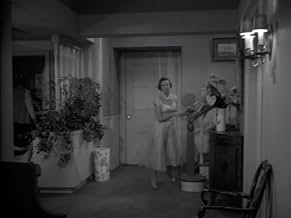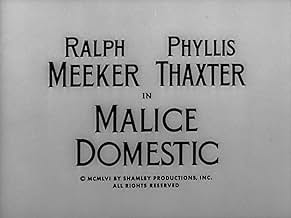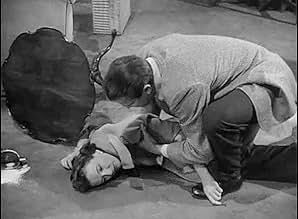Marital discord between writer Carl Borden and his wife Annette intensifies when poison is found in his food.Marital discord between writer Carl Borden and his wife Annette intensifies when poison is found in his food.Marital discord between writer Carl Borden and his wife Annette intensifies when poison is found in his food.
- Director
- Writers
- Stars
- Director
- Writers
- All cast & crew
- Production, box office & more at IMDbPro
Featured reviews
Ralph Meeker returns to the series as does Phyllis Thaxter, playing husband (Carl) and wife (Annette) who seem to have a happy life together --until he starts getting sick. The doc is called in, only to discover Carl is slowly being poisoned? How can that be?
If you're a true Hitchcock fan, you wouldn't want it any other way. Exceptional writing by Victor Wolfson, who penned many mysteries for the early tv show SUSPENSE. Perhaps a re-working of one of his stories. Beautifully done.
I agree with the last reviewer; there was (and still is) a CODE on tv where a murderer is NOT supposed to get away with a crime.... Hitch does conclude at the end the killer got their just reward! That's all we'll tell you.
Only debit: it's kind of strange to see two-fisted Meeker playing an artist? Meeker would have been more convincing as an athlete, like a high school or college coach. He's a tough guy, so it would take a lot of poison to knock him down.
A classic mystery for a late night. And once again, unless you've seen this, you will never guess the ending. From SEASON 2 remastered Universal dvd box set. 2006.
And it was. To me, "Malice Domestic" to me is the best of Lucas' three 'Alfred Hitchcock Presents' episodes, even better than "Jonathan" and leagues better than "Crackpot". Is it a series high point? No. Is it a season high point? Again no. Is it worth watching. Absolutely yes and actually in my view as far as this up and down season goes "Malice Domestic", even when not being perfect itself, is one of the better episodes while not being a high point (although it actually almost was).
It is only let down a little by having a little too much padding, will agree that the art studio and orange juice scenes were irrelevant and felt like padding.
Otherwise, "Malice Domestic" is very good. It really is enlivened by the acting, with scorching performances from Ralph Meeker and Phyllis Thaxter that have a lot of intensity without veering into melodrama. Their characters were ones that would have been easy to overact in lesser hands, but the two have the right amount of intensity and vulnerability. The character interaction similarly is intense. Even with the padding, the story still manages to be very suspenseful and not too typical. It really kept me guessing throughout and for me the ending was a big surprise. Despite not being directed by Hitchcock, it was a story and premise worthy of him and actually wasn't too far off his level when he is not quite on top form but with plenty of what made him so great.
Lucas gives his most assured direction of his three outings here and does really well at keeping the tension afloat, to me despite "Crackpot" being disappointing he did show signs of having potential of being a more regular director for the series but wasn't given a chance (or at least enough of one). It's slickly made with some nice atmospheric shots. The audio is suitably ominous and will never stop raving about the haunting use of "Funeral March of a Marionette" for the series' main theme. Hitchcock's bookending is typically droll in writing and delivery.
"Malice Domestic" is thoughtfully written without being talky or too melodramatic as well.
Concluding, very good episode. 8/10.
Reviewer Hitchcoc is right—this is the sort of entry that won the series a loyal following and classic status. It's not exceptional, but is very well done in all departments. Note how subtly the screenplay hints at an extra-marital attraction between the silver-haired Perry and wife Annette, supplying her with needed motivation. Note also the effective way director Lucas uses blended close-ups of Meeker to stage the final scene, underscored with a lightly humorous touch—perfect for the Hitchcock style.
The athletic, muscular Meeker would seem an odd casting choice for a stay-at-home writer, but I guess it makes sense when you think about it. Thaxter was an early Hitchcock favorite, being so good at suggesting inner conflict. But it's really Lily Kardell's Lorna that I watched. She's a terrible actress but has the kind of dimples a guy could get lost in.
Did you know
- TriviaThe use of arsenic in the green glaze has some basis in history. Green wallpaper was very popular among the affluent in the late 1800s, but it was eventually discovered that arsenic was leaching from the dyes into the air and slowly poisoning those who live in the rooms in which it was used. Though the arsenic on the outside of a vase wouldn't likely be much of a hazard, colorful pottery, has been notorious, even in recent years, for heavy metals leaching out of the glazes and into food that comes in contact with it.
- GoofsCarl enters Annette's studio while she is molding a vase. The clay is wet and glistening; in the next shot, the clay is completely dry.
- Quotes
[introduction]
Alfred Hitchcock: [With his hands thumbs up and on the lapels of his suit, Hitchcock faces the camera and paces back and forth as if he is arguing a case in a courtroom] Good evening. Ladies and gentlemen of the jury, the first case on today's docket is entitled "Malice Domestic." I hasten to add, however, that "Malice Domestic" is not about the servant problem, nor is it a puff for imported wines. It is concerned with some mysterious doings in a family of three: Carl Borden, his wife Annette, and their charming dog, Cassandra. To give you a clearer picture of exactly what happened, we now transport you to the scene of the crime where we shall reenact it.
- SoundtracksFuneral March of a Marionette
Written by Charles Gounod
Details
- Runtime
- 30m
- Color
- Aspect ratio
- 1.33 : 1












